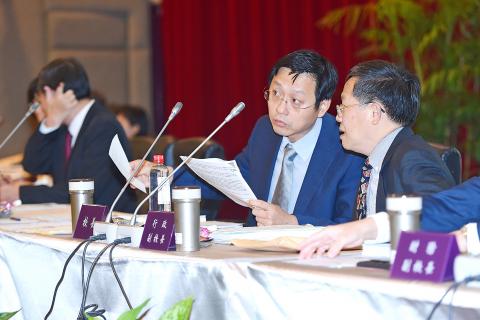The nation’s top academics are leaving the nation due to low wages and a worsening research environment, National Taiwan University (NTU) interim president Kuo Tei-wei (郭大維) said yesterday, warning against a possible collapse of the nation’s higher education system.
China’s Fujian Provincial Government Education Department has announced a plan to recruit 1,000 top Taiwanese academics to teach at its universities by 2020, a department report cited by the Chinese-language Xiamen News said on Friday.
The department intends to promote bilateral collaboration between Taiwan and China’s Fujian Province in certain disciplines and, long-term, to open universities, junior colleges and vocational schools in collaboration with Taiwanese academics, the report said.

Photo: Liao Chen-huei, Taipei Times
The department plans to recruit Taiwanese academics as part of its Fujian Pilot Free Trade Zone and other industrial development projects, it said.
Asked to comment on the plan after an NTU administration meeting in Taipei yesterday, Kuo said the nation’s higher education system would collapse if more academics left to teach in other countries.
More junior and senior lecturers could leave Taiwan because of relatively low wages for academics aged between 30 and 60, and the low pensions paid to retired academics, Kuo said.
While the average age of new NTU professors is 39, their pensions are only about half of their salaries, sometimes even lower than those of teachers at elementary and junior-high schools, he said.
Some NTU professors have already left for other countries, with others still weighing their options, he said, adding that the loss of top academics would lead to the departure of top students.
Under these circumstances, the nation’s higher education system could break down if the number of top-ranking universities continues to shrink, Kuo said.
Meanwhile, the Ministry of Education’s Yushan Project is to come into effect next year.
Under the program, professors would be able to earn up to 10 percent extra monthly in allowances.
The ministry also encourages universities to recruit top academics from overseas, who could then apply for research funding of up to NT$5 million (US$165,338) per person if their projects bear on the nation’s key development domains.
The ministry is to budget NT$5.6 billion per year for higher education, it said, adding that about 19,000 teachers could benefit from the project.
However, the Yushan Project is inadequate for top academics and the ministry should launch another project, perhaps named the “Alishan Project,” to improve the competitiveness of salaries and research grants, Kuo said.
Taiwan’s higher education system needs more exceptional and creative academics, he said, adding that not everyone with a doctorate is qualified to be a university professor.

AIR SUPPORT: The Ministry of National Defense thanked the US for the delivery, adding that it was an indicator of the White House’s commitment to the Taiwan Relations Act Deputy Minister of National Defense Po Horng-huei (柏鴻輝) and Representative to the US Alexander Yui on Friday attended a delivery ceremony for the first of Taiwan’s long-awaited 66 F-16C/D Block 70 jets at a Lockheed Martin Corp factory in Greenville, South Carolina. “We are so proud to be the global home of the F-16 and to support Taiwan’s air defense capabilities,” US Representative William Timmons wrote on X, alongside a photograph of Taiwanese and US officials at the event. The F-16C/D Block 70 jets Taiwan ordered have the same capabilities as aircraft that had been upgraded to F-16Vs. The batch of Lockheed Martin

US President Donald Trump yesterday announced sweeping "reciprocal tariffs" on US trading partners, including a 32 percent tax on goods from Taiwan that is set to take effect on Wednesday. At a Rose Garden event, Trump declared a 10 percent baseline tax on imports from all countries, with the White House saying it would take effect on Saturday. Countries with larger trade surpluses with the US would face higher duties beginning on Wednesday, including Taiwan (32 percent), China (34 percent), Japan (24 percent), South Korea (25 percent), Vietnam (46 percent) and Thailand (36 percent). Canada and Mexico, the two largest US trading

GRIDLOCK: The National Fire Agency’s Special Search and Rescue team is on standby to travel to the countries to help out with the rescue effort A powerful earthquake rocked Myanmar and neighboring Thailand yesterday, killing at least three people in Bangkok and burying dozens when a high-rise building under construction collapsed. Footage shared on social media from Myanmar’s second-largest city showed widespread destruction, raising fears that many were trapped under the rubble or killed. The magnitude 7.7 earthquake, with an epicenter near Mandalay in Myanmar, struck at midday and was followed by a strong magnitude 6.4 aftershock. The extent of death, injury and destruction — especially in Myanmar, which is embroiled in a civil war and where information is tightly controlled at the best of times —

China's military today said it began joint army, navy and rocket force exercises around Taiwan to "serve as a stern warning and powerful deterrent against Taiwanese independence," calling President William Lai (賴清德) a "parasite." The exercises come after Lai called Beijing a "foreign hostile force" last month. More than 10 Chinese military ships approached close to Taiwan's 24 nautical mile (44.4km) contiguous zone this morning and Taiwan sent its own warships to respond, two senior Taiwanese officials said. Taiwan has not yet detected any live fire by the Chinese military so far, one of the officials said. The drills took place after US Secretary